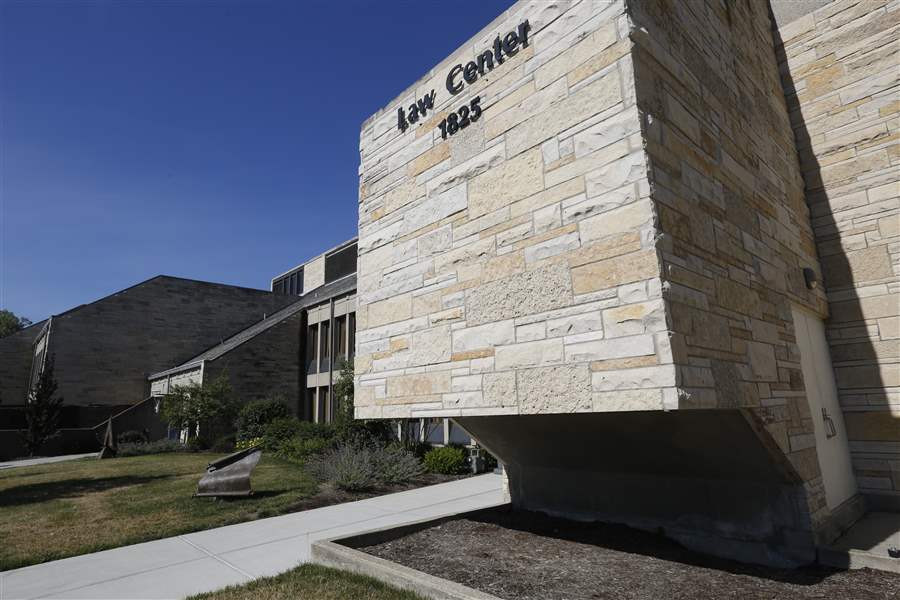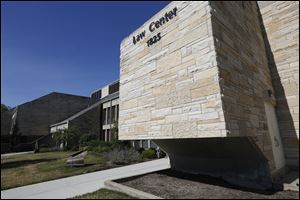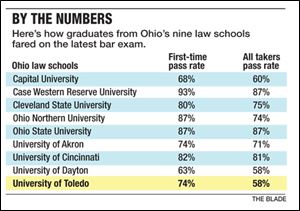
UT law school grads' passage rate on Ohio bar exam tied for worst in state
11/2/2017
The bar exam passage rate for the University of Toledo College of Law has reached its lowest mark in over 10 years.
THE BLADE
Buy This Image
The University of Toledo College of Law’s overall passage rate for the July bar exam is the lowest it has been in more than a decade — at 58 percent tying with the University of Dayton at dead last among Ohio’s nine law colleges.
But the rate of students passing on their first attempt jumped 11 percentage points from last year’s performance, and college officials hope that upward trend continues.

The bar exam passage rate for the University of Toledo College of Law has reached its lowest mark in over 10 years.
Seventy-four percent of UT law graduates passed on their first try in July, up from 63 percent in July 2016 and 67 percent in 2015.
UT is in the bottom half of Ohio law schools for the first-time pass rate, though not the lowest. Case Western Reserve University had the best first-time pass rate at 93 percent and tied with Ohio State University at 87 percent success for overall test takers.
Only 58 percent of the UT’s 52 total test-takers passed overall, which is the figure that includes graduates who took the test multiple times before they passed. That’s down from 59 percent in July, 2016, 60 percent in 2015, 77 percent in 2014, and 78 percent in 2013.
D. Benjamin Barros, dean of the law school, said he was pleased to see the first-time rate improve but was “not at all satisfied with the number.”
“We’d like to consistently be in the top half of Ohio law schools,” he said. “I think I would be a lot happier with our pass rate to be solidly in the 80-percent range rather than the 70s.”
Mr. Barros said law schools typically put more stock in first-time passage rates and added that annual college rankings such as the U.S. News and World Report look to that figure when comparing schools across the country. Even so, he said the 58 percent overall pass rate, which has dropped every year for the past five, is “not an acceptable number.”
“I’m not at all happy with the overall pass rate, which is low,” he said. “But it’s low because for the last couple of years our first-time pass rate has been low, so we have more repeat takers.”
Mr. Barros said the law school is already taking steps to improve the likelihood that UT graduates pass the bar on their first go. His hope is that will lead to fewer graduates taking the exam more than once, which would then lead to a higher overall pass rate.

Most law school graduates enroll in private bar preparation courses between the time they graduate in May to when they sit for the exam in July. Mr. Barros said graduates who don’t complete those classes typically don’t do as well on the exam as those who do, so the college added a new third-year course to help students prepare for the exam before they graduate and hired a director of bar preparation and academic success.
UT last year also created a new faculty mentoring program, which pairs each law school graduate with a faculty member who then stays in touch over the summer and encourages them to complete their preparation courses ahead of the bar.
“We’re still trying to crunch the numbers, but we think we increased the number of graduates who completed more of their bar course,” Mr. Barros said.
The law school has also been more selective with who is accepted into the program, something Mr. Barros believes will begin to improve pass rates in a few years. Students beginning law school next year also will be charged a $480 fee per semester to cover a comprehensive bar program intended to better prepare graduates for the exam.
“The whole point of the exercise of going to law school is to pass the bar and get a job,” Mr. Barros said. “And we’re in the business of student success. We want our students to pass the bar in really high numbers.”
The majority of law students graduate in May and sit for the bar exam in July, though some do graduate in December and take the test in February.
UT’s College of Law has been accredited by the American Bar Association since 1939.
Contact Sarah Elms at selms@theblade.com, 419-724-6103, or on Twitter @BySarahElms.